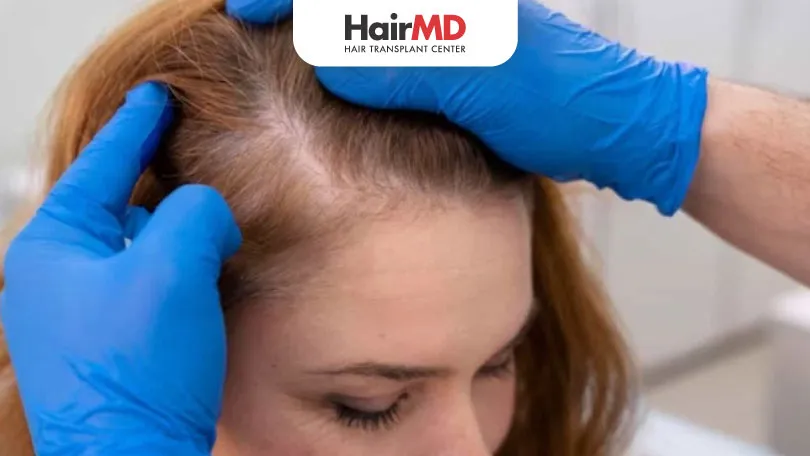30th Aug, 2023

What’s covered in the article?
- What is lupus hair loss?
- What are the symptoms of lupus hair loss?
- Conclusion
What is lupus hair loss?
Lupus, commonly called lupus erythematosus, is an autoimmune disease that often crops up as fatigue, joint pain, joint stiffness, and a butterfly-shaped rash on the face. In addition, there are individuals with lupus who experience hair loss.
Hair loss can be a common symptom of lupus, as body-wide inflammation can negatively affect the skin and hair follicles. Oftentimes, people who are diagnosed with systemic lupus (the most common kind) notice that their hair grows back when they start treatment, but that may not always be the case.
Not everyone who has lupus, experiences hair loss. Most people living with this condition notice gradual thinning or breakage along their hairline. Sometimes the hair grows back, and at times it doesn’t. According to research studies, lupus patients whose hair loss persists or returns after abating might show higher levels of disease activity.
According to research findings, there are mainly two kinds of hair loss involved in lupus: scarring and non-scarring. Non-scarring hair loss is the result of inflammation- a pronounced symptom of lupus that is often widespread. Hair loss can occur when this condition develops around the scalp and hair follicles.
Sometimes, lupus also results in discoid sores or lesions. These lesions can take shape anywhere on the body and cause permanent scarring. Lesions that form and leave scars on the scalp often deter hair follicles, resulting in permanent hair loss.
It’s important to note that inflammation caused by lupus doesn’t only affect hair on the scalp, but can also cause loss of eyebrows, beards, and eyelashes.
What are the symptoms of lupus hair loss?
Lupus doesn’t always affect the hair. But when it does, there’s a marked increase in the number of shed hairs. It’s normal to shed up to 100 hairs each day. However, people with lupus can lose more than this depending on the severity of the illness. If you have lupus hair loss, it may show up when washing or brushing your hair.
Some people may only have breakage around their hairline or minor thinning, while there are some who may complain losing clumps of hair. Hair loss can be widespread, or limited to a section of the head.
With lupus, the following type of hair loss can be seen
- Diffuse Telogen effluvium – this type of temporary excess hair shedding is commonly seen after any acute disease. It usually reverses once you start taking treatment
- Scarring discoid type of hair loss – When the lupus disease affects the hair follicles, it can show up as scarring and permanent patchy hair loss
- Lupus hair – These are the short damaged fine hair seen along the frontal area in women suffering from Lupus
- It can also be due to the immunosuppressive medicines that are given during the course of lupus.
Do You Know?
Nearly 250 Patients Visit HairMD
Everyday For Various Hair Concerns?
(Your journey to healthier and fuller hair starts here!)
Meet Our Dermatologists
Conclusion
Further Reading
Can Rainwater Cause Hair Loss? Understanding the Impact
Find out if Rainwater Cause Hair Loss & how to keep your hair safe during the monsoon season. Expert tips for keeping your hair healthy in rainy weather!
Monsoon Hair Care Tips | Healthy Hair in Every Season
Beat frizz, dandruff, and breakage this monsoon with our monsoon hair care tips. Get advice from a dermatologist in Pune to keep hair healthy all season!
Is Synthetic Hair Transplant Permanent?
Wondering if synthetic hair transplants last forever? Discover how long they last, benefits, risks & more at HairMD, your expert hair clinic in Pune.
Role of Genetics in Hair Loss and Restoration
Discover how genetics influence hair loss and what treatments like FUE, PRP, and GFC can restore hair naturally. Visit HairMD Clinic Pune for expert care.
Have thoughts? Please let us know
We are committed not only to treating you, but also educating you.










